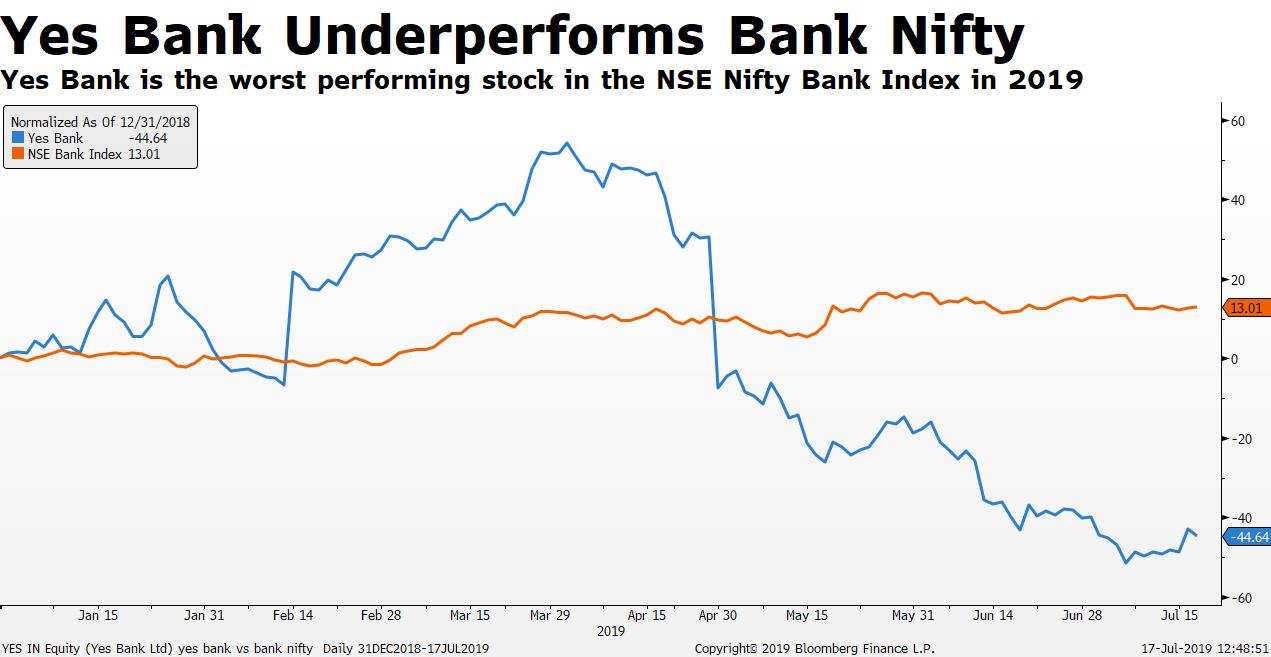
Private lender Yes Bank Ltd. returned to profitability in the April-June 2019 quarter after an unanticipated loss in the previous quarter. Profits, however, fell short of street expectations.
Net profit of the lender fell to Rs 114 crore from Rs 1,260 crore a year ago, according to its exchange filing. That compares with the Rs 201 crore consensus estimate of analysts tracked by Bloomberg. In the March quarter, the bank had reported a surprise net loss of Rs 1,506 crore.
Net interest income, or core income, rose 2.8 percent to Rs 2,281 crore, also lower than the Rs 2,477-crore estimate.
Ravneet Gill, the bank's chief executive officer, termed the quarter as one of consolidation.
We feel assured that we have put the house in order this quarter, and can start to look for strong growth in the coming quarters.Ravneet Gill, CEO, Yes Bank
The bank's asset quality worsened during the quarter. Its gross non-performing asset ratio rose to 5.01 percent from 3.22 percent in the previous quarter. The net NPA ratio rose to 2.91 percent from 1.86 percent in the January-March period. In absolute terms, bad loans rose 53 percent to Rs 12,092 crore.
The management, in the analyst conference call, shared the following details:
- Net slippages during the quarter stood at Rs 4,554 crore.
- About Rs 2,500 crore in slippages came from a Rs 10,000 crore watchlist identified in the March quarter.
- Watchlist for potentially stressed assets remains at Rs 10,000 crore.
- Two financial services companies, whose credit rating was downgraded during the quarter, have added to the sub-investment grade book. These were not earlier part of the watchlist.
- The sub-investment grade book of the bank now stands at Rs 29,000 crore due to these two large accounts.
Provisions in the April-June period were lower than the previous quarter as the bank chose to utilise contingent provisions made in the January-March quarter. In the first quarter, the bank set aside Rs 1,748.11 crore as fresh provisions.
“The bank had created contingency provisions of Rs 2,100 crore towards identified accounts in March 2019. In the quarter ended June 2019, the bank has utilised Rs 1,399.3 crore from the pool,” the filing said.
Provision coverage ratio for the bank stands at 43.1 percent, much lower than the 70 percent considered prudent. The credit cost for the quarter stood at 32 basis points, in line with the management's guidance.
Operational Performance
The bank, which is looking to raise capital, has slowed down growth, particularly in its corporate portfolio where it needs to bring down the exposure to large conglomerates like Anil Ambani group.
This brought down advances growth to 10.1 percent year-on-year. Loan book growth is likely to eventually stabilise at close to 20-25 percent, a senior official told BloombergQuint recently. Growth in retail advances remained strong 43.3 percent year-on-year.
Deposits grew by 5.9 percent year-on-year to Rs 2.2 lakh crore. However, the ratio of low cost current account, savings account (CASA) deposits fell to 30 percent from 35 percent a year ago.
The bank's capital adequacy ratio stand at 15.7 percent, with Tier-I ratio at 10.7 percent. A capital raise from the bank is imminent and may happen in two tranches, BloombergQuint reported earlier this week.
Whistleblower Complaint
In September 2018, RBI asked Yes Bank's founder and MD & CEO Rana Kapoor to step down from his position by Jan. 31, 2019. Kapoor was then replaced by former Deutsche Bank India head Ravneet Gill, who assumed the top office in March 2019.
Since then, the board of Yes Bank has also seen significant change, including the appointment of R. Gandhi as an additional director by the RBI.
In its notes, the bank said it has taken cognizance of anonymous whistle blower complaints that emerged in September 2018. These complaints alleged irregularities in the bank's operations and potential conflicts of interests related to the functioning of functioning of chief executive Rana Kapoor.
The bank conducted an internal enquiry of these allegations, which was carried out by management and supervised by the Board of Directors. “The Bank, at the direction of the Audit Committee and with the assistance of an external firm, is continuing to analyse the allegations in the whistleblower complaint and work is currently ongoing.”
The findings so far are not material to the financial statements of the bank, the lender said.
Shares of Yes Bank have fallen 44.5 percent so far this year against a 13 percent rise in the Nifty Bank Index. It's currently the worst performer on the index.

Essential Business Intelligence, Continuous LIVE TV, Sharp Market Insights, Practical Personal Finance Advice and Latest Stories — On NDTV Profit.























